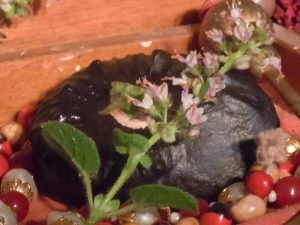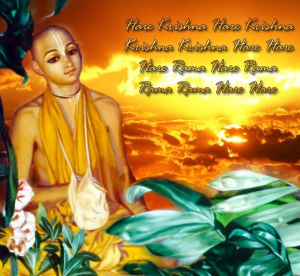The Story of Parsurama the Saktyavesa Avatara of God
SB 9.15 summary…The son of Jamadagni was Rāma, or Paraśurāma. When a king named Kārtavīryārjuna stole Jamadagni’s desire cow, Paraśurāma, who is ascertained by learned experts to be a saktyāveśa incarnation of the Supreme Personality of Godhead, killed Kārtavīryārjuna. Later, he annihilated the kṣatriya dynasty twenty-one times. After Paraśurāma killed Kārtavīryārjuna, Jamadagni told him that killing a king is sinful and that as a brāhmaṇa he should have tolerated the offense. Therefore Jamadagni advised Paraśurāma to atone for his sin by traveling to various holy places.
SB 9.16.9-My dear King Parīkṣit, the sons of Kārtavīryārjuna, who were defeated by the superior strength of Paraśurāma, never achieved happiness, for they always remembered the killing of their father.PURPORTJamadagni was certainly very powerful due to his austerities, but because of a slight offense by his poor wife, Reṇukā, he ordered that she be killed. This certainly was a sinful act, and therefore Jamadagni was killed by the sons of Kārtavīryārjuna, as described herein. Lord Paraśurāma was also infected by sin because of killing Kārtavīryārjuna, although this was not very offensive. Therefore, whether one be Kārtavīryārjuna, Lord Paraśurāma, Jamadagni or whoever one may be, one must act very cautiously and sagaciously; otherwise one must suffer the results of sinful activities. This is the lesson we receive from Vedic literature.
SB 9.16 18-19 purport.…Paraśurāma is the Supreme Personality of Godhead, and his eternal mission is paritrāṇāya sādhūnāṁ vināśāya ca duṣkṛtām [Bg. 4.8]—to protect the devotees and annihilate the miscreants. To kill all the sinful men is one among the tasks of the incarnation of Godhead. Lord Paraśurāma killed all the kṣatriyas twenty-one times consecutively because they were disobedient to the brahminical culture. That the kṣatriyas had killed his father was only a plea; the real fact is that because the kṣatriyas, the ruling class, had become polluted, their position was inauspicious. Brahminical culture is enjoined in the śāstra, especially in Bhagavad-gītā (cātur-varṇyaṁ mayā sṛṣṭaṁ guṇa-karma-vibhāgaśaḥ [Bg. 4.13]). According to the laws of nature, whether at the time of Paraśurāma or at the present, if the government becomes irresponsible and sinful, not caring for brahminical culture, there will certainly be an incarnation of God like Paraśurāma to create a devastation by fire, famine, pestilenceor some other calamity. Whenever the government disrespects the supremacy of the personality of Godhead and fails to protect the institution of varṇāśrama-dharma, it will certainly have to face such catastrophes as formerly brought about by Lord Paraśurāma.
SB 9.16.23 purport…Although Lord Paraśurāma was an incarnation of the Supreme Personality of Godhead, he had to account for sinful activities. Anyone in this material world, however careful he may be, must commit some sinful activities, even though he does not want to. For example, one may trample many small ants and other insects while walking on the street and kill many living beings unknowingly. Therefore the Vedic principle of pañca-yajña, five kinds of recommended sacrifice, is compulsory. In this age of Kali, however, there is a great concession given to people in general. Yajñaiḥ saṅkīrtana-prāyair yajanti hi sumedhasaḥ: [SB 11.5.32] we may worship Lord Caitanya, the hidden incarnation of Kṛṣṇa. Kṛṣṇa-varṇaṁ tviṣākṛṣṇam: although He is Kṛṣṇa Himself, He always chants Hare Kṛṣṇa and preaches Kṛṣṇa consciousness. One is recommended to worship this incarnation by chanting, the saṅkīrtana-yajña. The performance of saṅkīrtana-yajña is a special concession for human society to save people from being affected by known or unknown sinful activities. We are surrounded by unlimited sins, and therefore it is compulsory that one take to Kṛṣṇa consciousness and chant the Hare Kṛṣṇa mahā-mantra.
SB 9.16.24-Thus Jamadagni, being worshiped by Lord Paraśurāma, was brought back to life with full remembrance, and he became one of the seven sages in the group of seven stars.PURPORT-The seven stars revolving around the polestar at the zenith are called saptarṣi-maṇḍala. On these seven stars, which form the topmost part of our planetary system, reside seven sages: Kaśyapa, Atri, Vasiṣṭha, Viśvāmitra, Gautama, Jamadagni and Bharadvāja. These seven stars are seen every night, and they each make a complete orbit around the polestar within twenty-four hours. Along with these seven stars, all the others stars also orbit from east to west. The upper portion of the universe is called the north, and the lower portion is called the south. Even in our ordinary dealings, while studying a map, we regard the upper portion of the map as north.
SB 9.16.25-My dear King Parīkṣit, in the next manvantara the lotus-eyed Personality of Godhead Lord Paraśurāma, the son of Jamadagni, will be a great propounder of Vedic knowledge. In other words, he will be one of the seven sages.
SB 9.16.26-Lord Paraśurāma still lives as an intelligent brāhmaṇa in the mountainous country known as Mahendra. Completely satisfied, having given up all the weapons of a kṣatriya, he is always worshiped, adored and offered prayers for his exalted character and activities by such celestial beings as the Siddhas, Cāraṇas and Gandharvas.
Some Conclusions- This is a very important pastime for it tells us conditioned souls that we must be very careful in the execution of our daily affairs, otherwise sinful reactions will ensue. Even a Saktyavesa incarnation as powerful as Lord Parusurama had to atone for some slight sins, what to speak of us. During Krsnas pastimes Lord Balarama killed Romarharsana the disciple of Vyasadev with a kusa grass “weapon” just for disrespecting Him and the sages there told Him he had to atone for His “sin”, by going on pilgrimage, which He did. Balarma is directly the Supreme Personality of God being Krsnas direct expansion and there was no need for Him to atone for anything, but out of setting social etiquette, He respected the brahmana sages request.
SB 10.10.9 purport…“If one offers Me with love and devotion a leaf, a flower, fruit or water, I will accept it.” ” A devotee, therefore, does not eat anything that would require slaughterhouses for poor animals. Rather, devotees take prasāda of Kṛṣṇa (tena tyaktena bhuñjīthāḥ). Kṛṣṇa recommends that one give Him patraṁ puṣpaṁ phalaṁ toyam—a leaf, a flower, fruit or water. Animal food is never recommended for human beings; instead, a human being is recommended to take prasāda, remnants of food left by Kṛṣṇa. Yajña-śiṣṭāśinaḥ santo mucyante sarva-kilbiṣaiḥ (Bg. 3.13). If one practices eating prasāda, even if there is some little sinful activity involved, one becomes free from the results of sinful acts.
May 6 1973 LA….” Kṛṣṇa is not hungry. Kṛṣṇa is not hungry. He is self-satisfied, pūrṇa. But if His devotee offers Him something with love and affection, then He accepts. So do not think that “We have made such nice, sumptuous plate for Kṛṣṇa. Kṛṣṇa must eat.” No. There is no such thing, “must.” You cannot make Kṛṣṇa must. That is not possible.So Kṛṣṇa will see how much you have love for Him. Then He will accept. Otherwise He’ll reject. Therefore, it is forbidden, those who are nondevotee, those who are not initiated, those who are not chanting regularly, their offering to Kṛṣṇa will not be accepted. We must be very careful. We must know our position, whether I am sincerely following the principles of devotional service. Then Kṛṣṇa will accept. Yo me bhaktyā prayacchati. The real thing is bhakti. So either you offer Kṛṣṇa prayers or you offer foodstuff, everything must be along with bhakti, devotion, love. Then Kṛṣṇa will accept.



